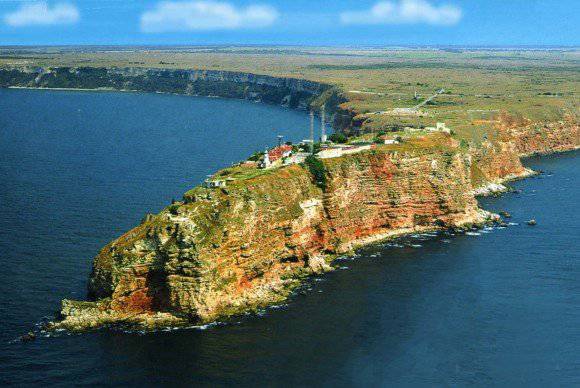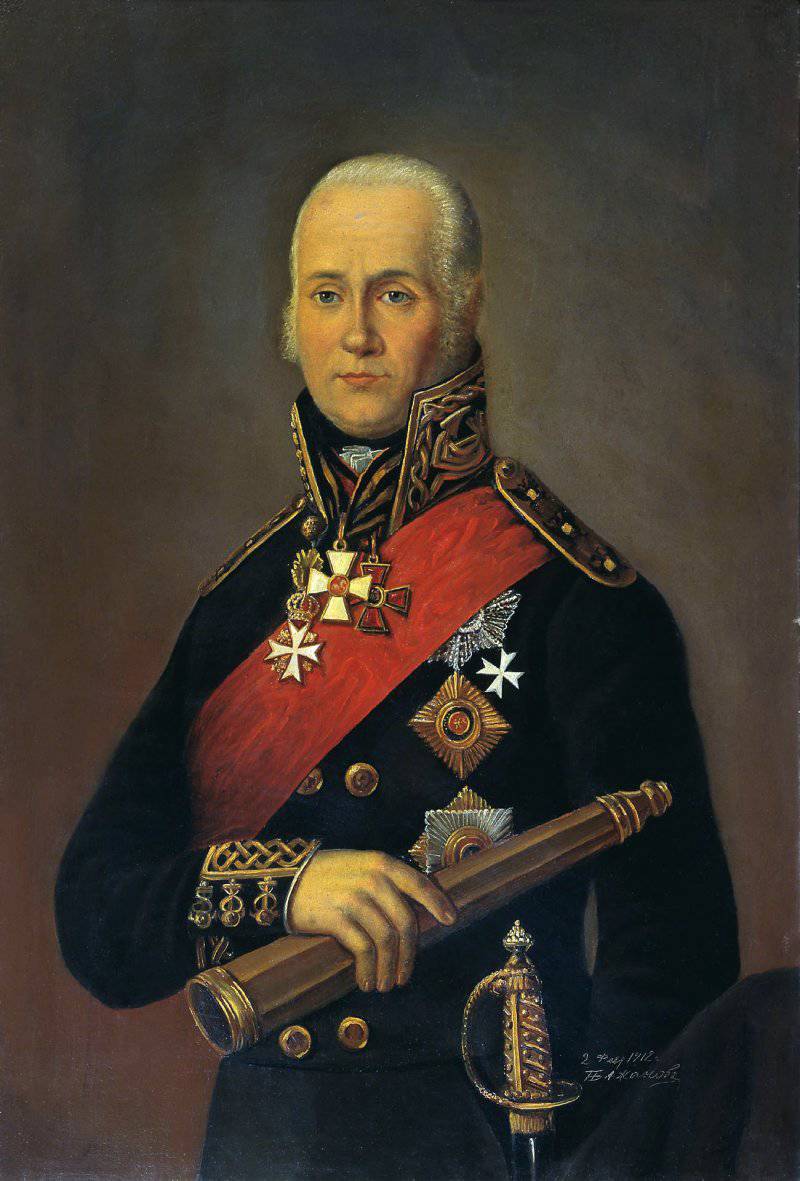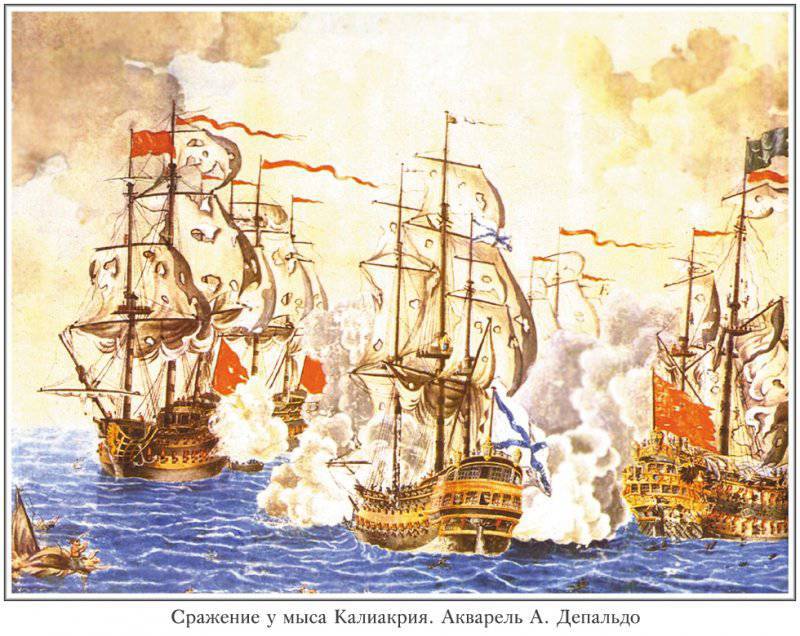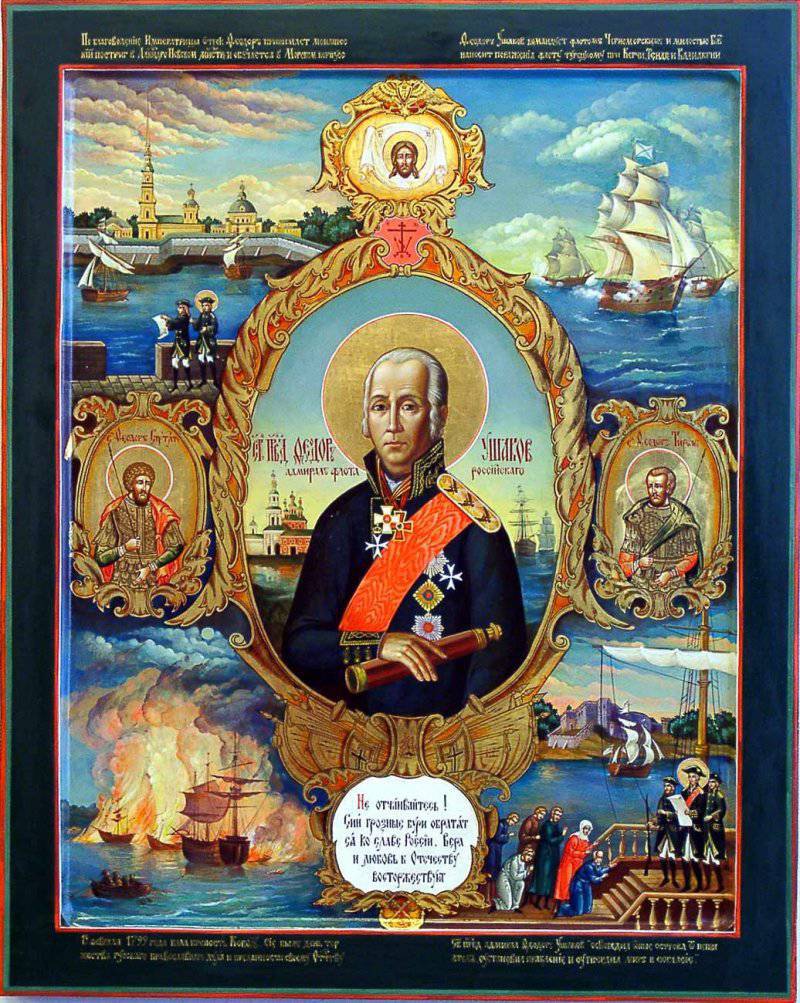Kaliakria - the beauty of victory!
Unique naval commander, the only one in Russian stories! But even from the brilliant series of his victories, Kaliakria stands out. This naval battle significantly affected the course of the Russian-Turkish war, consolidated the worldwide glory of the Russian Black Sea fleetbecame decisive in the campaign. The Ottoman Empire after Kaliakria showed compliance, went to the peace negotiations ending in the Yassi world. And, if this date is forgotten, we should be ashamed, because Kaliakria is the finest hour of the Black Sea Fleet. Alas, during the years of confrontation with Napoleon, when Fyodor Fyodorovich was retired, the importance of the fleet was underestimated in Russia and the victorious traditions were lost to a certain extent. Yes, and Kaliakria rarely remembered. Artillery, cavalry, infantry - that's who broke the invasion of two hundred languages. And a strong navy, as imagined by Emperor Alexander, was not much needed by the empire. The bitter lesson of the Crimean War showed the recklessness of such an attitude towards the fleet. A power spanning a whole continent cannot afford to forget about the seas. Peter the Great and Potemkin created Russian naval power - in the Baltic and the Black Sea. But how else could the empire protect itself from the encroachments of the most annoying opponents - Sweden and Turkey?
That was in 1791. Cape Kaliakria (Kaliakra) is located in Bulgaria, in Greek its name means “beautiful cape”. It is well-known to connoisseurs of local resorts: Golden Sands and Albena are within easy reach. The thin cape - for good reason the Bulgarians call it “the nose” - crashed into the sea for two kilometers. For Bulgarians, Ushakov is an Orthodox saint and hero liberator. The Bulgarians consider the battle of Kaliakria to be a prologue to the liberation from the Ottoman yoke.
 It was there that concentrated the Turkish ships, jam-packed with troops. To help the Turkish squadron arrived reinforcements from Africa. He was led by the "African" ships skillful naval commander Seit Ali - a native of Algeria, a very ambitious person. Winner of the Italian Navy! He rallied his sailors with proud statements, in which he swore to cruelly teach Russian Ushak-Pasha. “I will bring him to Istanbul, chained! I will carry it around the city in a cage! ”, Algerian shouted. No, he was not a mad bawler and boaster. Here you can see the psychological calculation: loud threats returned self-confidence to the “warriors of Allah”, who after several defeats began to fear Ushakov. Turkish commanders diligently supported the fire of religious fanaticism in the troops.
It was there that concentrated the Turkish ships, jam-packed with troops. To help the Turkish squadron arrived reinforcements from Africa. He was led by the "African" ships skillful naval commander Seit Ali - a native of Algeria, a very ambitious person. Winner of the Italian Navy! He rallied his sailors with proud statements, in which he swore to cruelly teach Russian Ushak-Pasha. “I will bring him to Istanbul, chained! I will carry it around the city in a cage! ”, Algerian shouted. No, he was not a mad bawler and boaster. Here you can see the psychological calculation: loud threats returned self-confidence to the “warriors of Allah”, who after several defeats began to fear Ushakov. Turkish commanders diligently supported the fire of religious fanaticism in the troops.The huge Ottoman fleet roared off the Bulgarian shores. The commander remained Kapuin Huseyn Pasha, beaten by Ushakov more than once, but the ambitious Seit Bey did not obey anyone except the Sultan. Turks did not have unanimous rule.
Coastal fortifications with artillery were also at the disposal of Gusein Pasha. But the main thing - 18 battleships, 17 frigates, armed to the teeth. 1600 guns on large ships. And yet - 43 auxiliary ship, also well armed. The power is very impressive in those days. Impregnable fortress on the sea. As long as the Turkish fleet and coastal batteries remained a single fist, this force was invulnerable.
We admit: these were not the best years of the Brilliant Ports. It was not easy for the Turks to keep in control the vast territory conquered during the Ottoman military heyday. Russia crowded Turkey. But let's not downplay the power of the Turkish fleet. And in the construction of ships, and in the education of sailors they were helped by the European allies, first of all - France. Russian sailors might envy the qualities of Turkish ships ... Turkish ships were faster, more maneuverable. It remained to present their own trump cards, and they had Fyodor Fedorovich: decisiveness, bold decisions, quickness, brilliant training of gunners, skillful actions of seamen in melee combat. Fedor Fedorovich was a true tutor of the army, the sailors of the Ushakov school were miraculous heroes.
Potyomkin understood that the battle with the superior forces of the Turks could end in tragedy for the fearless Russian admiral. “Pray to God! The Lord will help us, rely on Him; encourage the team and make it a desire to fight. God's mercy is with you! ”He wrote to Fyodor Fedorovich, his favorite. Of course, this instruction was superfluous: Ushakov and without Potemkin, and not only in the days of fatal trials, was sincerely prayerful.
For a long time, shortly, it was necessary to return to Russia the power over the Black Sea. The squadron of Ushakov consisted of 18-ti battleships, two frigates and 19-ti auxiliary vessels. Less than a thousand guns! Compared with the Turkish forces - almost nothing. It remained to rely on the Suvorov principle: win not by number, but by skill. And also - to the confusion that will arise in the Turkish ranks, if you manage to surprise, deafen the enemy.
And Ushakov, seeing the Turkish squadron, decided on a quick onslaught, not showing respect for the established rules. The Turks, observing the approach of the Russians, at first did not even believe that Ushakov would venture to attack.
And Ushakov did not even rebuild the ships in the line of attack, as required by traditional regulations. The Russian Rear Admiral hastily spent the ships in three columns between the coast and the Turkish squadron - under the fire of coastal batteries. If the Turks were ready to meet the uninvited guests - the Russian sailors would have to retreat. But they could not even imagine that Ushakov would decide on a recklessly bold attack. We overslept the Russian maneuver Turkish artillerymen. “Add sails!”, Ordered Ushakov, anticipating a bloody battle with the main forces of the Turks. He got his way: panic reigned in the Turkish courts, Seit Ali lost control of the ships ... They didn’t manage to form a line of battle, didn’t manage to organize artillery resistance.
Having endured the first - sudden - attack of the Russians, the Algerian tried to rebuild the ships for a counterattack, to catch the wind. Unlike Hussein, Algeria overcame the confusion of the first minutes of the battle and remained a dangerous opponent. Ushakov read this enemy plan - and on his own flagship “Christmas” he attacked Algerian. For the third time in this battle, Ushakov forgot about the rules of the sea battle. Out of the line, rushed to the attack with one goal: to deprive the Turks of the "head". In this episode, one of the best students of Ushakov, the commander of the “Nativity of Christ,” Captain First Rank Yelchaninov, did not lose hold.
The legend has survived: in close combat, Fedor Fedorovich shouted to the enemy: “Hey, Seit-Ali, slacker! I will wean you to make boastful promises! ” This is too romantic to be true, but Russian intelligence officers in Turkey at the time of Potemkin had enough and Ushakov could well know about the sassy statements of the Algerians.
In an hour-long battle, the qualities of the Russian sailors of the Ushakov school were reflected - their valor and accuracy.
And soon the ship of the brave Seid-Ali lost the sails, the deck flared, and he was forced to retreat. Himself Seid-Ali bloodied brought into the cabin. The defeat of the Algerian predetermined the collapse of the Turkish squadron. But the Ushakovsky flagship “Christmas” fell into a desperate situation: the ship was surrounded by four Turkish ships. Ushakov rushed into the thick of the battle, attacked. The “Christmas” was supported by other ships, and only the approaching storm saved the Turks from complete disaster. Ushakov wrote to Potemkin: the Turkish fleet was "quite smashed, mixed up and cramped so that the enemy ships themselves beat each other with their shots."
The Turks retreated in horror to Constantinople. Alas, the French ships were faster, Ushakov could not catch up with them in order to uproot the undisturbed forest. And Fedor Fedorovich started repairing his squadron. Two days later, the patched Russian ships were ready for new battles, as reported by Ushakov to Potemkin.
In the fiery hell Ushakov did not lose a single ship.
The battle killed and seriously injured 45 Russian sailors. Only on one Turkish ship, the flagship of Seit Ali, there were ten times more wounded and dead.
“Oh, great! Your fleet is no more! ”, The Algerian reported to the Sultan. In Istanbul, with horror they took wounded, frightened sailors. Seit-Ali was arrested, Hussein Pasha decided to disappear for good. Sultan seriously feared that Ushakov would turn the squadron on Istanbul and then - the grief of the great empire. Turkey had to become more accommodating - and Ushakov would visit Constantinople after the start of the peace talks. Not in a cage, but at the head of a squadron. And the Turks will be amazed by the meek disposition of the Russian sailors, discipline and military dexterity.
Grigory Alexandrovich Potemkin was seriously ill in those days. He will not live to see the signing of the Yassky peace. With excitement, he followed the campaign of his favorite, his winning naval commander. Kaliakria was the last triumph of the all-powerful Prince of Tauride - a victory as beautiful as the Black Sea. “The Turks do not even know where their scattered ships have gone; many thrown on the Anatolian coast. Six ships entered the Constantinople Canal at night very damaged. The admiral ship sank and asked for help. Their sultan and the whole city are alarmed by their cannon shots. In the afternoon, the sultan saw their ships wrecked without masts, with many dead and wounded, ”Prince Tavrichesky triumphed in a letter to the empress.
Potemkin tried: for Kaliakria and Ushakov, and his officers were rewarded generously. Fedor Fedorovich received the Order of St.. Alexander Nevsky, a half dozen heroes - George and Vladimir of the second and third degrees.
We rightly call the glorious admiral Suvorov of the Russian fleet: Ushakov was a tutor, father-commander for officers and sailors. Fedor Fedorovich made a revolution in the tactics of sea battles, broke templates, choosing the shortest way to victory, surprised contemporaries with Ushakov’s piety. Finally, Ushakov, having served with weapons in the hands of four decades, remained invincible. How is it in Suvorov!
All his life he served in the navy and was not raised by Suvorov. Still, Ushakov is the brightest student of Suvorov.
And the innovative moves that Ushakov used in Kaliakria were assiduously assimilated by the greatest naval commanders of the world. Admiral Horatio Nelson, admiring Ushakov, seven years later, under Aboukir, would attack the French ships from the coast and from the sea. He will repeat the tactics of Ushakov and seven years later, under Trafalgar.
Inflexible in the smoke of battles, Ushakov in his life remained a humble, humble man. And society has long underestimated him. The greatest naval commander did not have the first degrees of the orders of St. George and St. Vladimir. It was not made to princes, nor to counts, nor to barons ... For Ushakov, there was no place on the St. Petersburg monument to Empress Catherine and the great figures of her era, nor on the Novgorod monument dedicated to the millennium of Russia - and, alas, no one was surprised. The exploits of Ushakov were not interested in artists, poets. Yes, and military historians are not too zealous: I will mention only the book of R. Skalovsky, published in 1856 year. Ushakov undeservedly was in the shadow of the glory of other heroes of Russian history - for the time being. Oddly enough, true glory came to the invincible admiral in the twentieth century.
... At the beginning of 1944, the USSR Commissariat of the Navy addressed Stalin with a proposal to establish the orders and medals of Ushakov and Nakhimov. The question arose: whom to put above? In those years, Nakhimov was much more popular in the army and among the people. The Sevastopol epic and the feat of Nakhimov in the pre-revolutionary tradition were considered (and rightly so!) As the apotheosis of heroism. But Admiral N.G. Kuznetsov, who knew well the history of wars, understood that there was simply no one to put next to Ushakov in the history of the Russian fleet. Kuznetsov's arguments convinced Stalin - and the leader of the USSR opened the way for scientists, artists, writers, cinematographers to study and glorify the exploits of Ushakov. Even during the war years, the Supreme devoted time to reconstructing the portrait of Admiral Ushakov. Mikhail Mikhailovich Gerasimov, having studied the admiral's skull, presented his version of the portrait. Connected to the work and experts from the Academy of Arts. Books, paintings, sculptures ...
Of the many publications devoted to the naval commander and published after 1944, we will highlight the magnificent three-volume edition edited by R.N. Mordvinov, in which the life and work of Ushakov is shown in detail, on the basis of documents, and the popular historical novel by Leonty Rakovsky, which was read by boys in all libraries of the USSR. Well, and the pinnacle of fame is the film dilogy of Mikhail Romm: "Admiral Ushakov" and "Ships Storm Bastions". Ushakov - Ivan Pereverzev! This actor dedicated the power of his talent to the fleet: he played a major role in the films “Ivan Nikulin - Russian Sailor”, and there were also sailors in the films “Home”, “The Tale of“ Neistom ”,“ Michman Panin ”,“ Treasure of the Republic ”, "Day Angel"…
But it was Ushakov, the Russian sea bear, invincible and meek, strong and merciful, who became Pereverzev for the Pereverzev. But he played exactly the “righteous warrior”, pay attention to Pereverzev’s eyes as Ushakov, to the attentive, compassionate look.
After Pereverzevsky "Abolished!" Ushakov forever occupied a well-deserved place in the assembly of the hidden heroes of the Fatherland, known to all of Russia. From now on, Ushakov is loved and revered. Who knows, the miracle of the canonization of Ushakov as a locally-venerated holy Saransk and Mordovia diocese in 2001 would have happened without this film? Directed by Mikhail Romm, this work was somewhat dismissive, as a burdensome order. And it turned out a miracle - timeless canvas ...
Many remember October 2004, when the Bishops' Council of the Russian Orthodox Church ranked Ushakov among the church saints in the guise of the righteous. The righteous warrior Theodor Ushakov is the patron saint of the navy and strategic aviation Russia.
For a long time we can talk about the modesty of the invincible admiral. After all, even portraits of Ushakov did not really remain. We judge his appearance by the Gerasimov's attempt to restore the face from the skull, but also by the same Pereverzev, whose image is repeated by modern monuments to Ushakov. Admiral and poets did not sing. Derzhavin once mentioned Fedor Fedorovich in the notes to the verses and only.
Ushakov did not worry about loud glory. Holy Admiral ...
Deeds, loneliness, righteousness, oblivion, glory, icon - this is the way of the warrior, drawn from above. Truly unique way.



Information